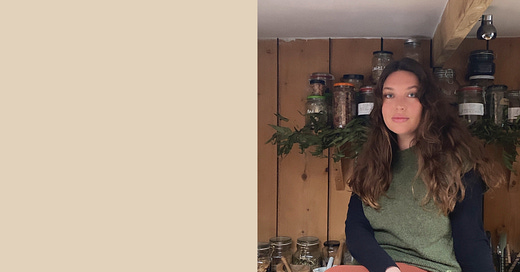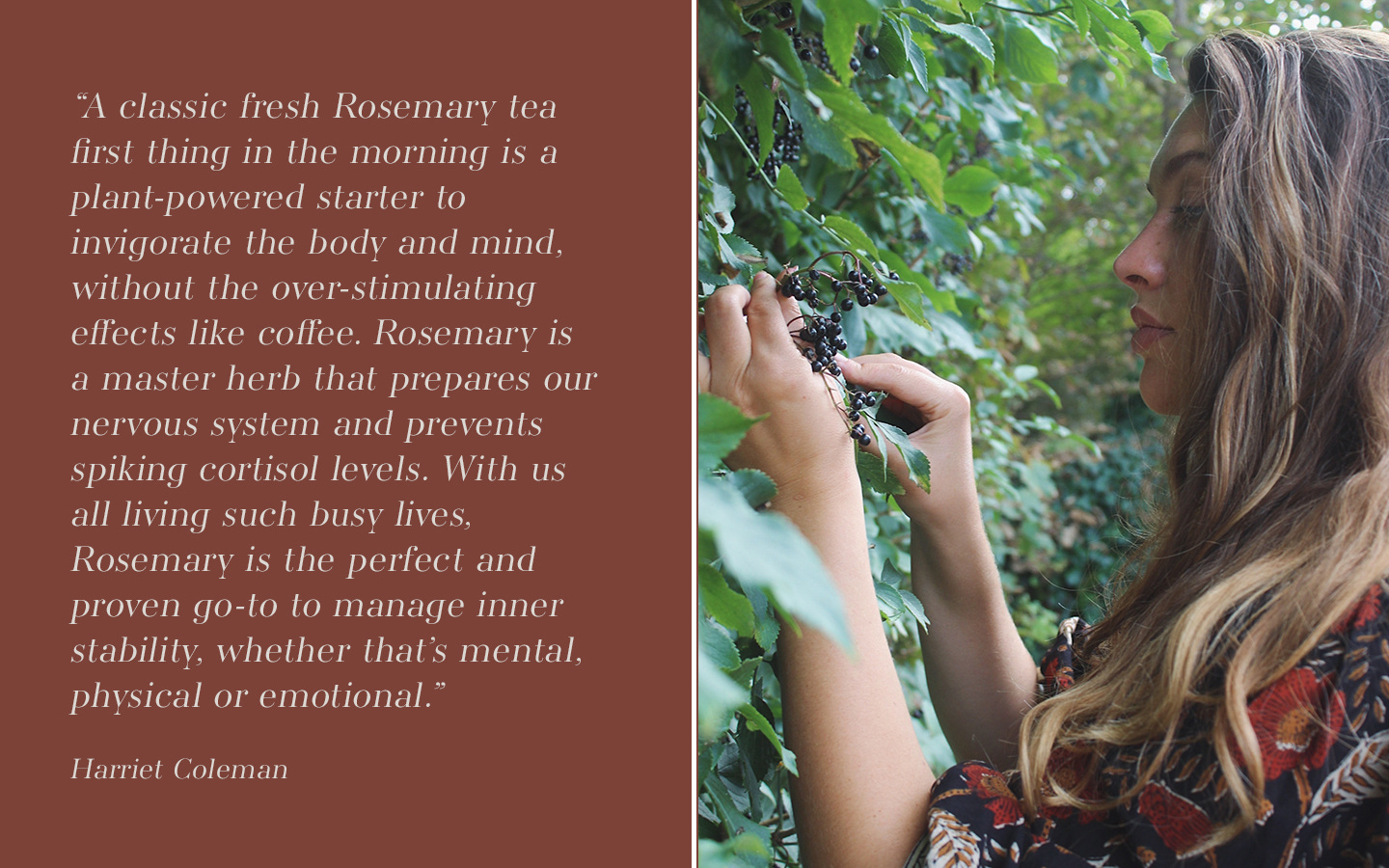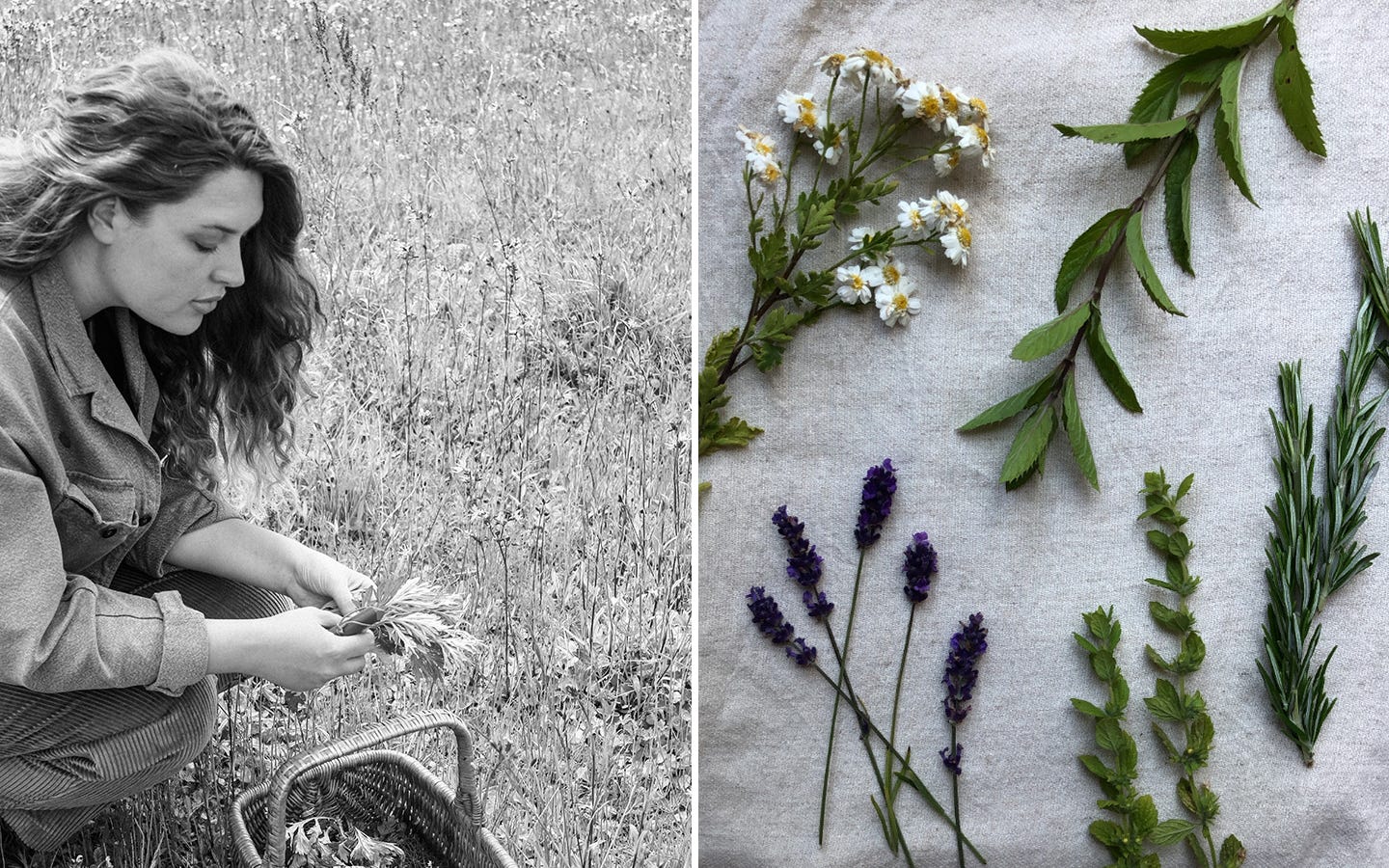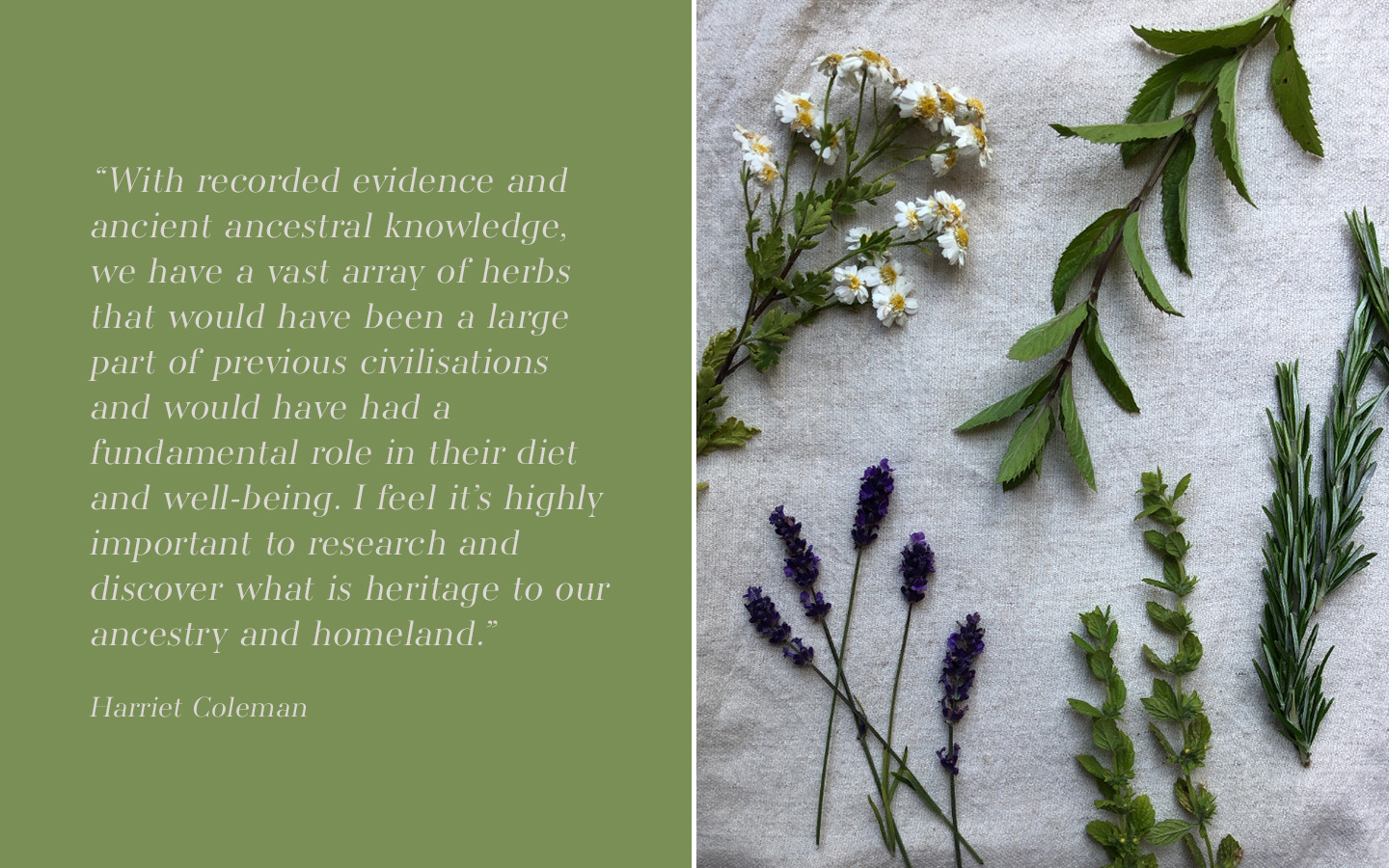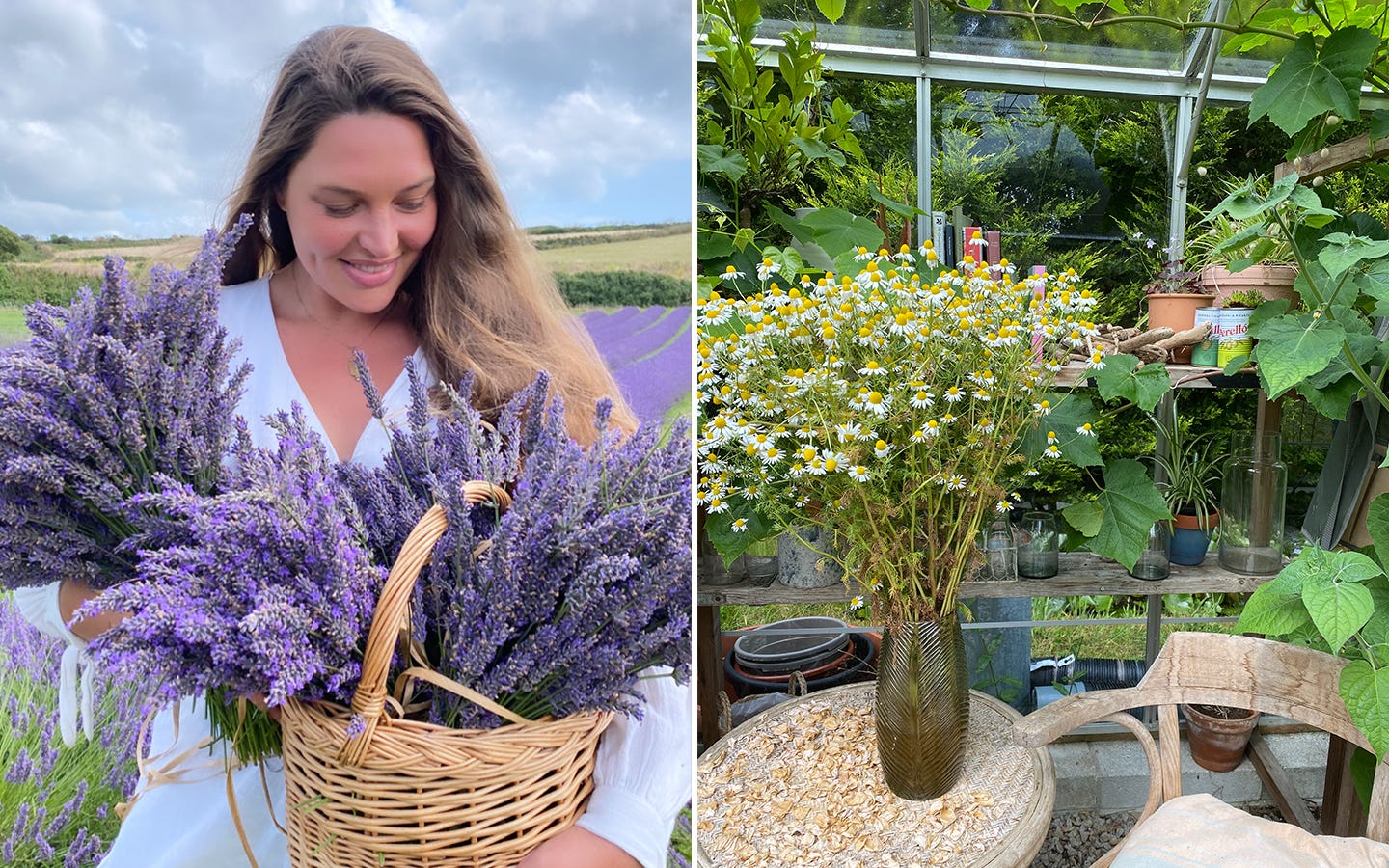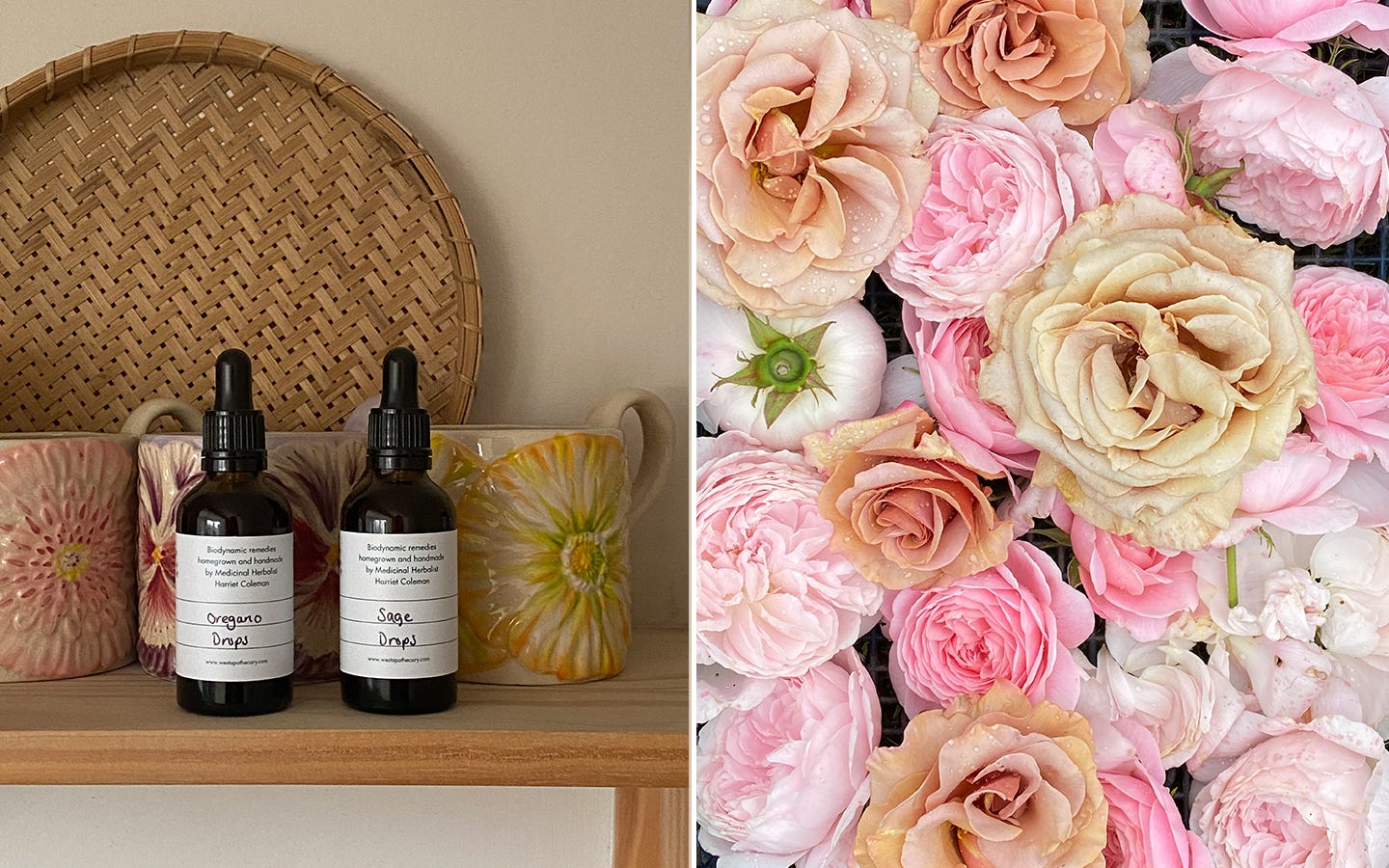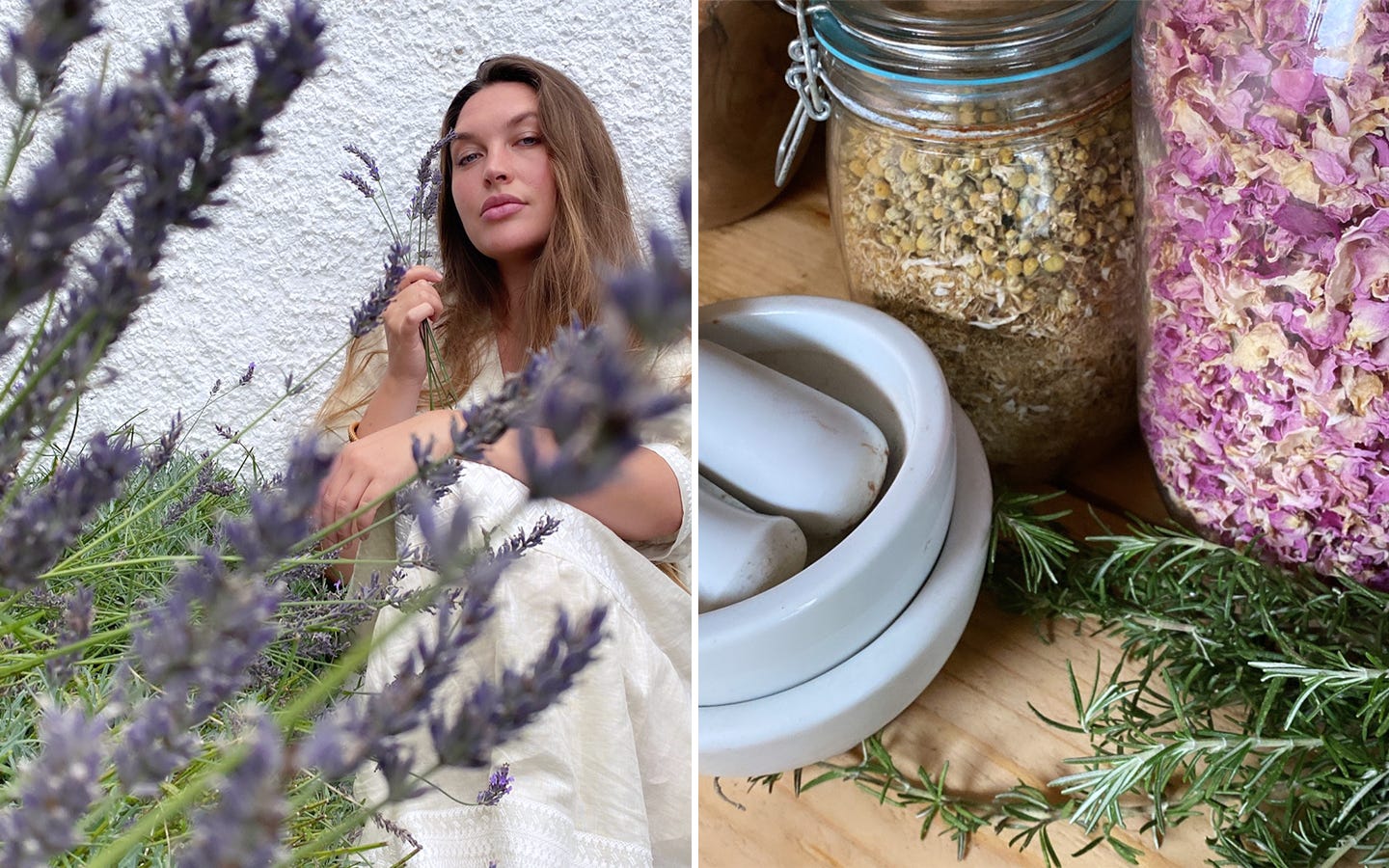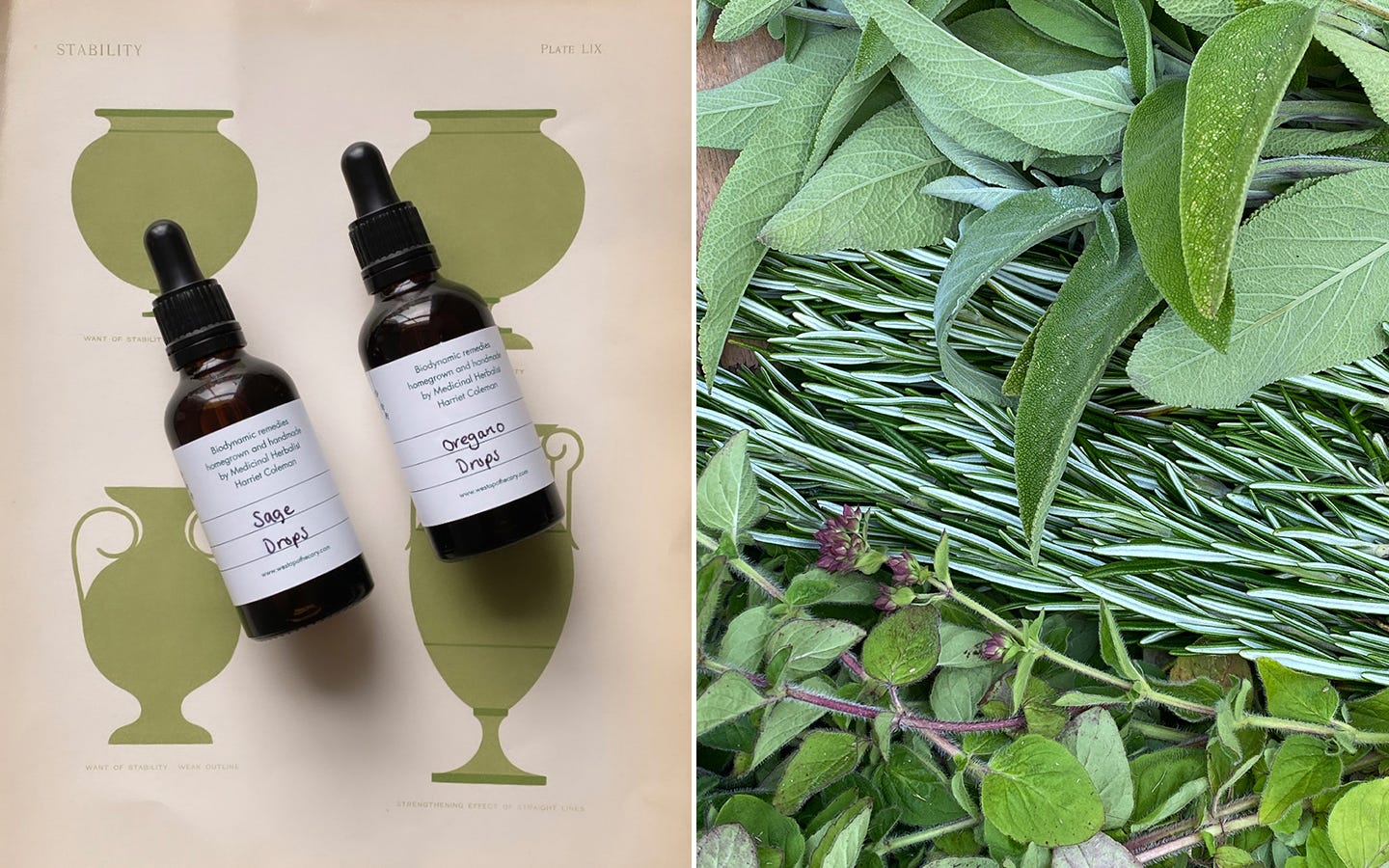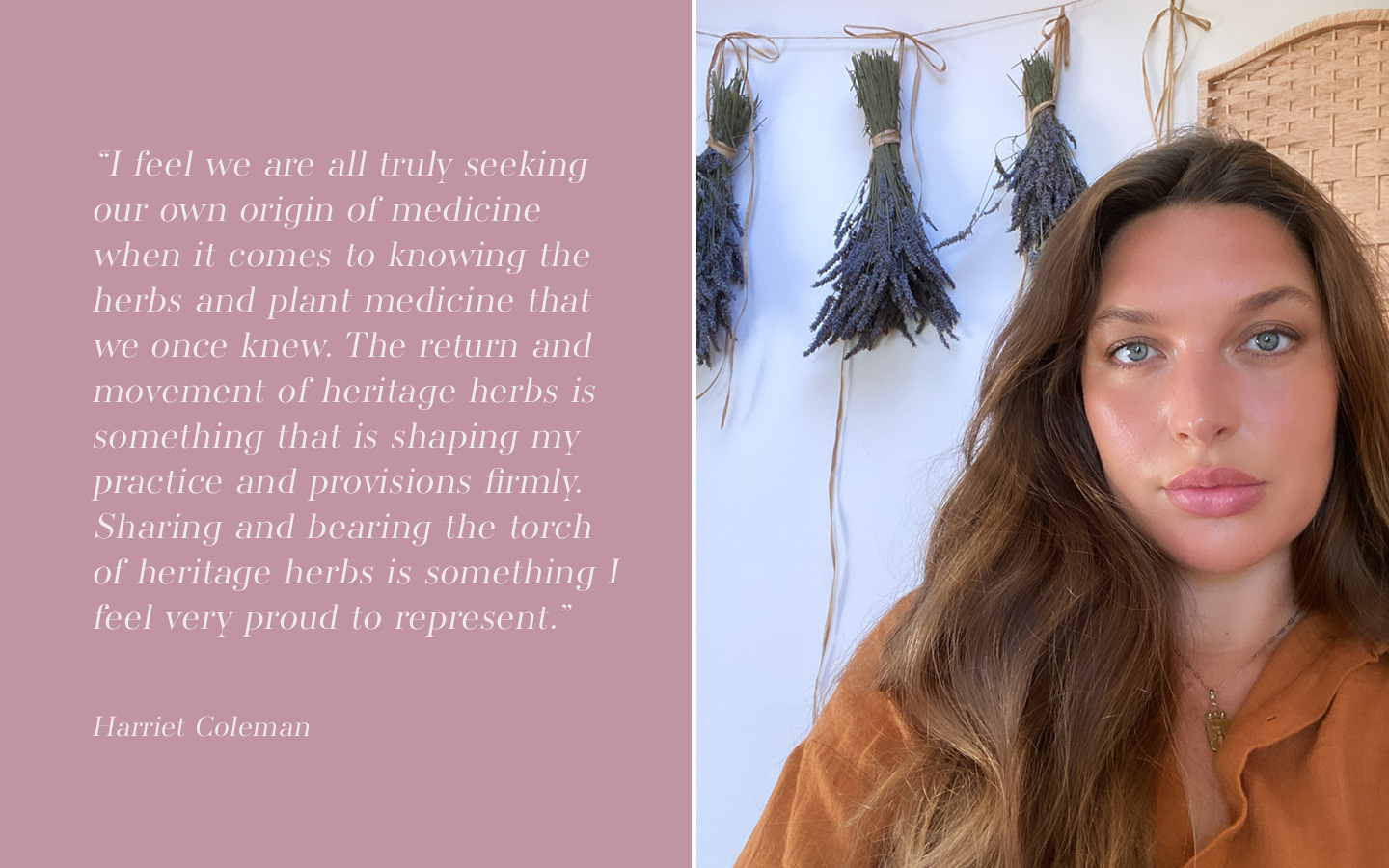Heritage of Healing: Native Plants & Herbal Wisdom with Herbalist, Harriet Coleman
We discuss foraging wild British plants to heal inflammation, modern Ayurveda and the future of natural medicine using heritage herbs.
Before undergoing her own healing journey and path into discovering the ancient practice of herbal medicine, Harriet worked as a model for twelve years, working with renowned clients including Macy's, Italian Vogue, Max Mara, and Selfridges, amongst others, which also led to appearances in TV and film. Once Harriet decided to retire from her modelling career after more than a decade, she became the face of The Body Shop, reigniting her passion for the natural world.
During this period of her life, Harriet recognised the toll that the modelling industry had taken on her well-being. As a result, she embarked on a journey to reconnect with nature, enrolling with one of the country’s leading herbalists and finding her 'true calling' in life: working directly with nature, and founding West Apothecary.
Hello Harriet, Your work reflects a deep connection with the nature that surrounds you. Throughout your work, you are closely aligned with the nature on your doorstep; whether it's through foraging for plants, and then also growing your own apothecary plants that form the foundations of your healing tinctures and balms. You engage intimately with the environment, and this very hands-on, nature-centered approach, keeps you closely connected to the soil and attuned to the changing seasons. Such profound knowledge can only come from years of direct observation and study, both of nature and of the human body.
I’d love to explore your journey into herbalism on Land Journals and delve into your experiences and insights gained through the cycles of your learning.
Rachel: Do you have a morning or daily routine that you follow, and are there any rituals or habits that you've cultivated that help you in your life?
Harriet: Of course! I am a believer in setting your day mindfully, especially with certain herbs that can awaken, stabilise and support us all day long. A classic fresh Rosemary tea first thing in the morning is a plant-powered starter to invigorate the body and mind, without the over-stimulating effects like coffee. Rosemary is a master herb that prepares our nervous system and prevents spiking cortisol levels. With us all living such busy lives, Rosemary is the perfect and proven go-to, to manage inner stability, whether that’s mental, physical or emotional. I also use fresh herbs when having my first meal, to support my digestion and gut biome throughout the day, as many herbs carry natural pre and probiotics. Fresh Coriander, Dill and Parsley are just a few that I regularly use, chopped, sprinkled or stirred into cooked food, again, to activate my digestion and for the day ahead.
Rachel: Can you tell me about your background and what drew you to herbalism? And what drew you to specialise in herbalism as a form of healing?
Harriet: My childhood was surrounded by the natural hedgerows of Wiltshire and with a mother who has always had an interest and background in natural health. It was very normal for her to treat any imbalances, coughs and colds, using what we foraged or home-grew, turning many herbs into elixirs, balms, syrups and more, so we had quite the natural medicine cabinet and it was something that never failed us. As children we would rarely visit a doctor; instead, our practitioners were a local Kinesiologist, Homeopath or Medical Herbalist.
Slightly going off path - I moved to London and worked for many years in fashion, as a model. This fast-paced life led me to use conventional medicine, as it was more ‘convenient’, and I then unsuccessfully, couldn’t treat some of the health struggles that I encountered. After 12 years in the fashion industry and after a collection of health issues, knew it was time for me to return to the countryside and reunite with what once worked for me. Herbs have always been successful and reliable for me. After consulting with some trusted natural health experts and then embodying my own personal health progress - this then navigated me to my next venture, life work and purpose. I then qualified in Western herbal medicine and Ayurveda, to now running an established apothecary and herbal health clinic, life really does a full circle!
Rachel: Can you describe your philosophy or approach to your work with plants and creating herbal medicine?
Harriet: I emphasise to my clients, and students, and also remind myself - that herbalism is a lifestyle. It’s a sustainable and reliable source of medicine and nutrition that has been backed with evidence to tend, aid and prevent many imbalances, or what we know in the West to be a ‘diagnosis’. Just as nature operates in unison with its surroundings, and in coexistence with all organic life- this is the same principle in herbal medicine and the body. To be well, is to be in relation to our natural surroundings and through herbalism. Ingesting herbs via food, drink and our practices, with the correct guidance from experts, can only enhance our health positively. Herbs are as important as food and can be easily integrated into your day, and the more that we normalise them within our diet, the more we arrive and remain within a place of health and balance.
Rachel: You work with native British plants, do you have any experiences that you can share about working with the local natural landscape and the wisdom that unfolds from this?
Harriet: I’m an advocate for heritage herbs for numerous reasons. Within Western society, we tend to look outside of our own history, knowledge and resources, with the mindset that something outside of our own culture and country must be better. To my understanding, this is an act based on history and a reputation of colonialism. With recorded evidence and ancient ancestral knowledge, we have a vast array of herbs that would have been a large part of previous civilisations, and would have played a fundamental role in their diet and well-being. I feel it’s highly important to research and discover what is heritage to our ancestry and homeland.
As a practising herbalist, I have the responsibility to recognise what is local to us, that will be to the benefit of our health, and then apply that within my clinic and for my clients. During my studies as a Western herbalist, my teachers always made heritage herbs a priority to work with first when treating a patient.
With them imparting our historical plant medicines, it was apparent that sourcing herbs from the local lands and hedgerows was, and is a more sustainable way of practising herbal medicine. This has encouraged me to honour our heritage, and of those before us who had not lost their connection to the land and understanding of heritage herbs to stay well, preventing illness and disease.
Rachel: Are there any restrictions when working with native plants and medicine, and are there ever moments when these aren’t enough to facilitate healing in someone?
Harriet: Very rarely are there plant medicines and herbs that restrict my practice. Here in the UK and within Western herbalism, we have vast variations of herbs to work with, all providing a plethora of properties and benefits for treating both acute and chronic conditions and diagnoses. Alongside working with the Western approach, my studying and training in Ayurveda for over 5 years has broadened my knowledge when understanding plants and the body. Sometimes working with Ayurvedic herbs can be a more fitting choice for the patient and their unique constitution (dosha), especially when working on the specifics of the person's health, and managing the root of the cause.
When it comes to sourcing Ayurvedic herbs, I have connections with an Indian family who grow their own herbs, which are then turned into medicines, being the highest grade with a biodynamic approach to farming. To support and work with a family where Ayurveda is very much a part of their heritage only feels right. I feel very privileged and grateful to know the intricacies and the science of Ayurveda (the oldest science to date) and I have intentions to pay homage to this valuable medicine, by paying a visit to India and meeting the families that grow and supply these herbs. It is a privilege to provide this practice here in the UK.
Rachel: What would you say are the biggest guiding forces throughout your work, are there any particular themes that consistently show up in your work with clients?
Harriet: Recent conversions with a previous teacher had said that “we live in a time of inflammation”, and she is not wrong. Inflammatory conditions are currently the most popular cases that we treat as herbalists. These cases range from, IBS, acne and eczema, endometriosis, PCOS and more. The term inflammation is a blanket term, used within the more conventional system of understanding the body. With a holistic approach, herbalists and other functional health practitioners tend to witness the body and person as a whole, and a symptom is a result of an imbalance or an outcome from a pathway of accumulation that has occurred previously.
My initial herbal consultations are held within a 2-hour appointment, unravelling health history, and discovering the origin of someone's health imbalance and struggle. Working with herbs is one method, but we also have a defined understanding of food types, what to introduce and eliminate, how to prepare foods and herbs suited best for your needs and even daily practices that are prescribed within a herbal programme. Integrating an encompassing regime of ingesting herbs, foods and activities, herbalists receive profound results from our patients, usually successful. From my practice alone, the person I treat who is experiencing a form of inflammation tends to turn around health-wise, or as we say, has returned back to homeostasis. The more accountable we are and take responsibility with the right guidance, I truly believe we will defeat this current ‘issue’, within this world of inflammation.
Rachel: Are there any specific health conditions or ailments that you find herbal medicine particularly effective for treating?
Harriet: Most conditions and ailments herbalists can treat, even if the patient is experiencing a chronic condition. If someone needs emergency care, then ‘modern’ intervention is very necessary. As studies have shown, with most everyday illnesses, there are preventatives, that are a high percentage sourced from plants that can be and are used for treatment. There is enough evidence to say that the more we work with prevention, especially of the herbal kind, we will have fewer conditions and ailments. We have become removed from what nature has intelligently provided for us, as there is a whole network of medicine that only enhances our health for the better. The most effective form of treatment is prevention, and that is something that we need to choose every day.
Rachel: What is one universal herb that works for everybody?
Harriet: Rose, it’s a limitless force when it comes to its benefits and properties. We use it for so many different conditions, imbalances or everyday maintenance. It’s deeply harmonising and works directly with the nervous system, it being a nervine. It’s a powerful rejuvenative, especially post-surgery and supports recovery and enhances repair, plus a tonic for heart health, and purifies the blood due to it being rich in bioflavonoids. It works wonders on the emotional body too, for those who are experiencing any trauma, grief and disharmony. Rose is a fantastic herb and remedy for children too, deeply calming, and a go-to for upset tummies and even parasites.
Rachel: Are there any herbs or herbal combinations that you find yourself recommending frequently? And Why?
Harriet: I commonly combine herbs such as fennel, rose, cardamom and chamomile which work directly on the digestive system. So many patients come to me with gut issues and digestive problems. All four herbs mentioned alone work precisely with immediate effect and monitor the causal route due to their pre and probiotic attributes, as well as being highly adaptogenic and rebalancing.
Rachel: Can you discuss any ethical considerations or cultural sensitivities involved in working with or using herbal medicine?
Harriet: As a herbalist or anybody who pays an interest in natural medicine, we have a healthy obligation to not only do our research as to where herbs originate from but to respect and be aware of the many cultures, traditions, the origins of herbs, the lands and the people, as to where these plant medicines originate from. It’s part of our work and service, to be versed in the science and properties of herbs, from local or afar, but it’s of high importance to credit and acknowledge cultures and indigenous peoples who have preserved herbs through their lineage, throughout conflict from western society. A repetition of history is something that we can inhibit, but we just have to be mindful of the consideration of other cultures and communities. Indigenous peoples are the original scientists, having and holding such valuable wisdom that today’s science is only catching up with, it’s our responsibility to not disregard those who are indigenous but to further preserve their knowledge.
Rachel: What do you see as the future of herbal medicine, and how do you envision your role within it?
Harriet: I already see a large shift in how people understand herbal medicine - with a dated belief system where those who have been convinced that herbal medicine doesn't have a place within the modern world. Herbal medicine is now increasingly becoming a trusted go-to for our everyday needs, with a rise in patients and even individuals who want to become practising herbalists. My role is to remain accessible for those who need treatment and to educate and advocate herbal medicine, as it is a science that is very much here to stay. The medicine of plants is a part of our past, and even more so, plant medicine is our future.
Rachel: How should we be harnessing or working with nature, for this next season, and for the rest of the year?
Harriet: Nature by no mistake is designed to nourish us in advance, in accordance with the seasons. As we encounter warmer times, and spring being our current phase, bitter herbs are best to integrate with daily methods, such as drinking and eating. Nettle, Cleavers and Dandelion are advised during this time, treating the lymphatic system, kidneys and liver after a damp stagnant winter. As we transition into summer, cooling herbs are then best to ingest; Calendula, Rose, and Chamomile to name a few, make a delicious cool infusion, or cold tea to sip throughout your day. Preventing any inflammatory-based conditions or flare-ups, which can be influenced by the summer season.
Rachel: What do you wish people knew about plant medicine?
Harriet: That you don’t need to be a herbalist to work with and understand herbs. Herbs are accessible to everyone whether that’s growing your own, working in a community garden or even exchanging with friends. Herbal medicine is not a last resort when it comes to treatment and health care, herbs are an everyday essential to maintain balance and prevent so many illnesses that can occur when we don't incorporate prevention. Lastly, herbal medicine is the people’s medicine and the knowledge of herbs and plant medicines is a birthright to know and to use for ourselves and others.
Rachel: What are you reading or learning about right now?
Harriet: I am currently in my 5th of year of studying the oldest science to date, Ayurveda, with renowned herbalist and Ayurvedic expert Anne McIntyre. I was a student of hers when learning Western herbalism, where she’d mention the intricacies of Ayurveda and elements of understanding the body from an Eastern approach. This then hooked my attention to discovering more, with an ongoing interest and curiosity in learning natural medicines and their modalities. Both of these medicines are something that you can’t stop studying, even past qualifying. As herbalists, we are constantly rediscovering the science of plant medicines and how to work with them, studying is very much part of our job. A teacher once said in our first lecture “To be a herbalist, you will be a student of nature forever’. I am currently reading the rather thick textbook of Ayurveda, a complete guide to clinical assessment, Vol3 by Vasant Lad.
Rachel: What’s on the Apothecary stereo playlist right now?
Harriet: Some lovely new additions, Earth Garden by Nada, Medicine by FACESOUL and Pink Rose by Say She She. My apothecary playlist is specifically made for those who want to enjoy making their herbal creations with nature and plant-related background ambience, being with a delicious herbal tea and soaking in the sounds with the properties of the herbs.
Rachel: Is there anything currently inspiring you that you can share?
Harriet: What’s currently inspiring me is witnessing the revival of heritage herbs. I feel we are all truly seeking our own origin of medicine when it comes to knowing the herbs and plant medicine that we once knew. The return and movement of heritage herbs is something that is shaping my practice and provisions firmly, which solidifies my training and understanding and is then to be passed on and provided to others. Sharing and bearing the torch of heritage herbs is something that I feel very proud to represent.
Rachel: What’s next for West Apothecary & yourself, for this next year and beyond?
Harriet: I am currently in the transition of a rebrand, which West Apothecary has led me to now. With an emphasis on Heritage, my product range and herbal drops will be dedicated to locally sourced herbs, traditional to herbalism in the West. West Apothecary will be transformed into ‘Herbalist Harriet’ as a name, and a newly designed range will be in retail stores later this year. I am also working on some projects with companies that have nature as their core value and figurehead, where herbs are something that they want to integrate into their business, which can then educate their customers. I also have some exciting collaborations that will be launched and shared later this year.
Rachel: What is one truth that you wish everyone knew?
Harriet: That herbs really do work, and provide such positive results for us all. It really is the medicine of the people.
Rachel: What’s your astrology - sun, moon, rising?
Harriet: My Sun is in Aries, My Moon is in Libra and my Rising is in Virgo. A fiery and passionate perfectionist, with a love for health, all things beautiful, and who works at living a life in harmony!
Find out more about Harriet’s work here:
You can follow Harriet’s work on Instagram
Herbalist Harriet (Coming Soon)
The Land Journal Interviews
Welcome to a series of curated interviews on LAND Journals, with the handpicked people who inspire me the most. These are the individuals who have a unique perspective on life and bring something entirely new into the World. They challenge my viewpoint and rouse my thought processes, bringing an enlivening new interpretation of life, and, I’m hoping that their insights will do the same for you. These truthful conversations are important, unfiltered, and mostly unedited. So, if you haven’t already, subscribe for more deep dives into the lives of some of the most fascinating people around. If you loved this interview, then please share it, your support means the world.
If you’d like to be considered for an interview, get in touch via email: hello@rachelholland.co.uk
Follow LAND Journals here.


